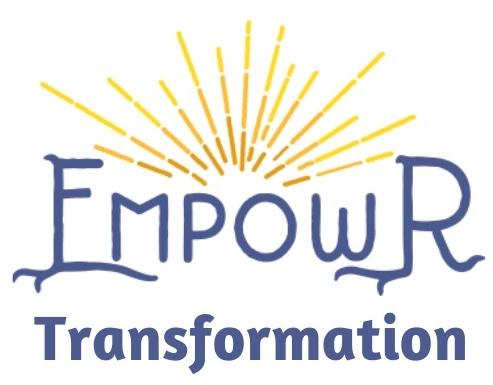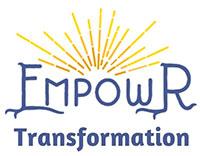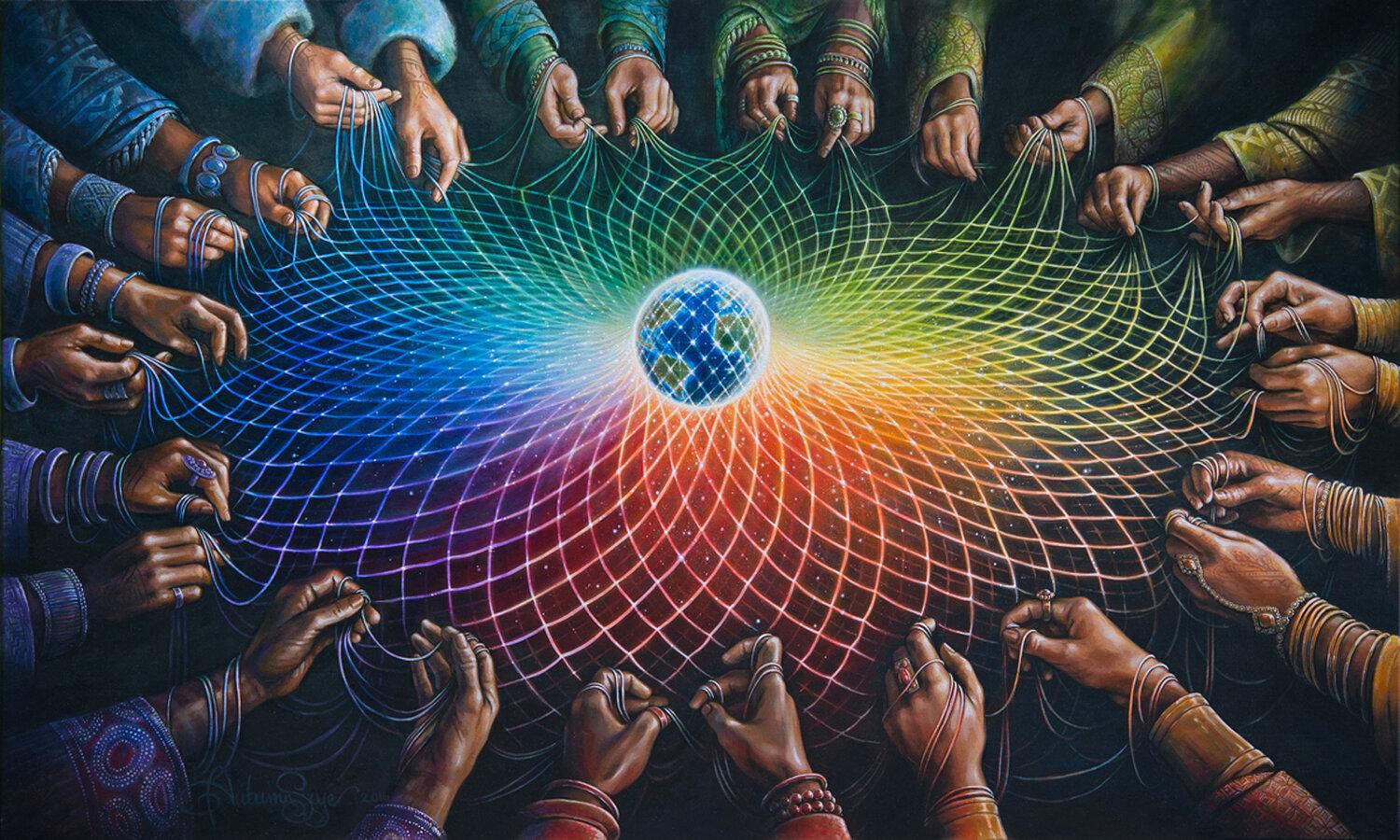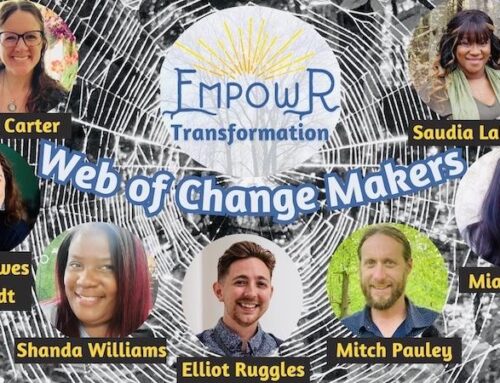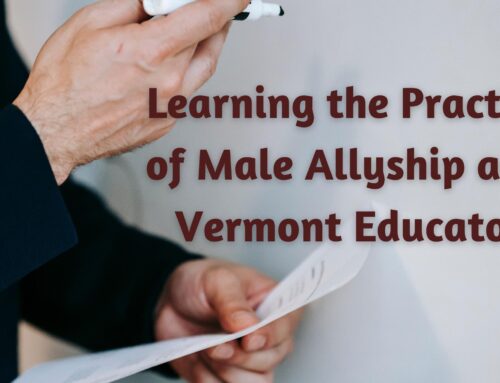“What is the direction of your path? Is your purpose to bring new ideas to the old paradigm? Is it to maintain an energy of normalcy? Is it to build new structures and systems for a new paradigm?”
These were questions raised in a vulnerable and honest conversation with a colleague when I made the decision to discontinue five years of volunteer service on the board of directors for Vermont Businesses for Social Responsibility (VBSR) in June 2021, when I published the high octane essay The Public Relations of Racism: Decolonizing Leadership.
Trying to Affect Change on a Board of Directors
When white progressive professionals jumped on the racial reckoning bandwagon following the murder of George Floyd, I watched how performative allyship seeped into the organizational culture of VBSR—the urgency to be the good white business leaders who would become allies and change systems to center justice, equity, diversity, and inclusion. While my experience was with VBSR, this was a widespread energy in white, progressive professional spaces, that has considerably waned, given that disruption to racism requires shifts in wealth and power structures of the people who lead, and benefit most from these spaces.
Having been moving through the self-examination required of an anti-racism journey that began several years prior, I asked if I could serve in a role to facilitate how we begin to approach the magnitude of racial justice. These were the exact words I spoke to the board members in June 2020:
“A VBSR commitment to diversity, equity, and inclusion for racial justice means changing BOTH personal AND organizational behavior. We’re being asked by BIPOCs to go beyond what we consider to be good intentions and to look at the impact of our behavior, and to change fundamental aspects of who we are and how we function to work towards dismantling white supremacy culture. This includes the beginning steps of being uncomfortable, allowing messiness, dismissing perfectionism, slowing down, and taking the time to build meaningful relationships. Racial justice is not a PR opportunity and many in Vermont right now are making it just that. We are being asked to look at the changes we need to make for justice from the perspective of BIPOCS, not the changes we hope to achieve for our interpretations of positive impact. It’s not about what we need to do when, but who we are and how we will change.”
A messy and uncomfortable process did indeed unfold. One that met all of Resmaa Menakem’s (author of My Grandmother’s Hands and The Quaking of America) criteria for WHY white people are unable to change the culture of the status quo:
- Ignorance and lack of education about the truth of history and the impacts of the dominant power systems
- Fear of losing access to power, privilege, and wealth
- Identification with subjugated trauma and inability to decouple it from racialized trauma
As the person on the board with the least power, wealth, and privilege, being an advocate for changing a culture that other board members and the organization as a whole so deeply identify with was not only triggering to all involved, but was re-traumatizing for me, leaving me ineffective in my efforts and ultimately cancelled from the VBSR network.
I made the mistake of staying too long and was exhausted at living the repetitive experience of using privilege to lose privilege without the support of community to hold each other in this work. I realized this siloed way of trying to affect change was no way to practice allyship and accompliceship for the movement towards racial justice. In fact, it only perpetuates the white savior complex, as if I, by myself in a white power structure space, can have impact beyond raising uncomfortable questions.
This experience served as a powerful teacher, reminding me that trying to affect change within the current systems and structures is a toxic path for me unless backed by the power of supportive and loving community. A lesson I failed to learn the first time in my efforts to shift toxic culture at the Vermont Sustainable Jobs Fund where I was employed for five years as communications director and suffering from burnout just prior to my cancer diagnosis in 2018.
Thankfully, when I resigned from the VBSR board of directors in June 2021, I was able to effectively manage the health repercussions from the years of healing work I have been integrating into how I experience and process life. In resigning, I was able to clearly trust that my energy, knowledge, experience, and heart belongs in the space of building new culture beyond the dominant systems and structures. The rest of this essay unpacks complexity and offers clarity in understanding culture, trauma, dominant systems, and weaving the world anew.
Culture and Epigenetics
Culture is the container of a community, family, social group, organization, state, country…and all of the content of that container. Belief systems, shared values, expectations, and norms are all examples of the cultural attributes for any given group, structure, container. Culture is shaped by the words, actions, behaviors, interpersonal communications, messaging and narratives, and how people respond to experiences—and very notably—trauma.
Traumatic experiences are anything that happens too fast for too long, too much too soon, too little too late. Trauma has many “domains” as described by Resmaa Menakem, therapist, author, trauma specialist, founder of the Cultural Somatics Institute, and anti-racist educator of somatic abolitionism. Resmaa refers to the domains of trauma as HIPP theory—historical, intergenerational, persistent institutional, and personal trauma. Personal trauma can further be broken down into adverse childhood AND adverse adulthood experiences.
In my own exploration of healing personal trauma, catalyzed by my cancer health crisis, I began to explore the concepts of historical and intergenerational trauma through ancestral healing work, which also can enter into the domain of past life trauma, if you believe in the evolution of consciousness.
As my studies in how trauma impacts the body expanded, I found my way into somatic healing work through sound and movement by deepening relationship with nature, reclaiming my past as a singer, and awakening to my wise woman ancestry. My ancestry work opened the floodgates of unpacking historical trauma and into the depths of beginning to understand racialized trauma.
Through my studies at the Cultural Somatics Institute, I learned racialized trauma is the manifestation of physical, mental, emotional, and spiritual illness rooted out of the historical trauma impacts of genocide, colonization, enslavement, and land theft. Traumatizing Bodies of Color and Culture created the dominant systems that continue to harm, threaten, and kill People of Color today. These systems benefit white people and, at the same time, also harm white people not positioned with the most powerful, elite, wealth holders who control the dominant systems.
The impacts of genocide, colonization, enslavement, and land theft are imprinted in the DNA of anyone who was a victim of these brutalities, anyone who participated in, colluded with, witnessed, and so forth. While the horror of the history of this country has unquestioningly impacted People of Color, it is important to understand that racialized trauma affects us all, though not at all in the same ways.
Epigenetics is an emerging science that studies how behaviors and environment can cause changes that affect the way the genes work (Centers for Disease Control). Research is starting to prove what Indigenous people, Black people, and other People of Color have instinctively known for years from their own lived experiences – that the effects of trauma can be intergenerationally passed on through epigenetic mechanisms (Frontiers in Psychiatry).
Epigenetics is a science of change and it is also connected to how we evolve as living beings who are a part of the energetics of nature. Traumatic imprints in a person’s life and in the lives of our ancestors alter the physical and chemical structures of DNA (Live Science). Trauma gets passed down from within the genes.
I first began to understand epigenetics in relationship to cancer and the DNA mutations taking place in my body caused by environmental and social toxins. This study expanded into how behaviors get passed down over time in response to how to how our bodies override traumatic experiences.
The survival and coping mechanisms people develop to manage traumatic experiences changes the chemicals in DNA. What may once have been survival behaviors become, as Resmaa says, “decontextualized over time.” Individual behaviors become personality and then they become family characteristics, which, over time, turn into community and social norms, and over more time, turn into culture.
In very basic terms, a Black person being scared easily by something behind them or fearful of a dog approaching them is a direct descendant of being chased, controlled, and killed by slave patrol officers and the dogs used to sniff out people who tried to escape the brutality of slavery.
A white person afraid to speak up when they see someone being treated unfairly by someone with more authority or who are afraid to speak their perspective when it might help someone else out of fear of how they will be judged is a direct descendant of being silenced by those with more power and forced to witness brutal and inhumane acts inflicted on other people.
White Supremacy Culture
Racialized trauma is a dis-ease steeped in the dominant culture of white supremacy. White supremacy culture goes far beyond the actions of blatant racism. Learning to be less triggered by the word is a step in being able to unpack its complexity, toxicity, and threats to all of our humanity, recognizing that the darker a person’s skin the more harmful and negatively impacted they are from the norms of white supremacy culture.
As communicated by Tema Okun, author of White Supremacy Culture – Still Here and steward of the compilation of resources available at WhiteSupremacyCulture.info, white supremacy culture:
- Is the widespread ideology that whiteness, constructed by how the power elite and ruling class colonized the land through genocide, enslavement, and land theft to serve capitalism, and to commodify and dehumanize all living things in the name of power and profit for a few at the expense of many;
- Teaches us that blackness is valueless, dangerous and threatening; that indigenous people and communities no longer exist, or if they do, are to be exorcized and romanticized or culturally appropriated as we continue to violate treaties, land rights, and humanity; that people south of the border are “illegal”; that Arabs are Muslim and that Muslim’s are terrorists; that people of Asian descent are indistinguishable and threatening as the reason for COVID.
- Pits other races and racial groups against each other while always defining them as inferior to the white group.
- Is reflected in the current realities of disproportionate and systemic harm and violence directed towards BIPOC people and communities in all aspects of national life – health, education, employment, incarceration, policing, the law, environment, immigration, agriculture, food, housing, and society.
White supremacy is defined by many behaviors that comprise the culture – from urgency and perfectionism to defensiveness and fear. There is much to learn and unpack in this body of work and I encourage you to begin here, paying special attention to the characteristics of white supremacy culture: WhiteSupremacyCulture.info
Dominant Power Systems
In my process of unlearning and relearning in anti-racist self-examination, I continuously need to look at how the characteristics of white supremacy culture live within my body, behaviors, and narratives. A recent exploration has been working with the foundations of somatic abolitionism to build anti-racist culture with Resmaa Menakem in an intensive Education for Racial Equity program. Resmaa explains that when looking at dominant power systems, white supremacy culture is only one of several. The dominant systems also include:
- Patriarchy – male dominated power structures that operate by the exclusion and oppression of women
- Capitalism – an economy based on the factors of supply and demand (fueled by the principle of scarcity mindset) that extracts labor and environmental resources for private ownership profit at the expense of workers and the planet
- Ableism – social norms and structures that discriminate against people with disabilities and classify people with disabilities as inferior to those without disabilities
- Cis-Gender/Hetero Normative – cultural narrative and paradigm that normalizes and privileges assigned-at-birth (cis) genders and binary sexual identities (straight men and women) while marginalizing and dismissing other genders (eg non-binary, trans, two-spirit, gender queer) and sexual identity (eg gay, lesbian, bisexual, pansexual, queer)
For some time, I have been referring to these five dominant systems as dominant culture, and while that is true, I have also come to learn it is imperative to look at each of these systems separately. As a white, cis-gendered, mostly able bodied woman, I not only benefit from, but also contribute to the compliance of the systems where I am advantaged.
At the same time, I have also experienced layers of oppression and marginalization from trying to navigate and succeed in a patriarchal system of dominance and the constrictions and inequities of capitalism. Refusing to assimilate to many characteristics of white supremacy culture, while at the same time perpetuating others also contributed to a toxic dominant system overload in my body that resulted in a health crisis, most notably marked by cancer. The dis-ease was physical, mental, emotional, and spiritual and further contributed to downward economic mobility and diminished health ability, exacerbated by cancel culture for speaking up about these very issues and perpetuating my own trauma pattern, as I referenced at the beginning of this essay.
Through my work with Resmaa, I have come to understand how my own subjugated trauma from my participation, defiance, and compliance in the dominant systems was inhibiting my personal commitment to racial justice.
I have been deeply invested in disrupting the status quo with the power and privilege that exists from my white, cis-gender, hetero-presenting, able-body presenting, middle class upbringing, English speaking, Western-colonial educated, well spoken and written social location.
While shared in the beginning, I bring us back to what Resmaa states as the restrictions white people face in being able to disrupt the status quo:
- Ignorance and lack of education about the truth of history and the impacts of the dominant power systems
- Fear of losing access to power, privilege, and wealth
- Identification with subjugated trauma and inability to decouple it from racialized trauma
While I am fully aware of the truth of the history of this country and personally experience the loss of power, privilege, and wealth as someone who speaks up and acts for transformative justice, I did so in a way that blurred the lines between my own subjugated trauma and the racialized trauma of People of Color.
There is a reason white people don’t speak up. It isolates and disconnects us from belonging to the dominant systems which both harm us AND provide for our security and livelihood. While many components of my livelihood were stripped away from my own experience with health and trauma, being a solitary voice advocating for change in spaces where change threatens someone else’s power, privilege, and wealth only exaggerated my solitude, further triggering trauma responses in my body and making my voice ineffective.
And so goes the insidious dis-ease of racism and how the rugged individualism of America keeps us separate and without community – effectively designed to keep us from challenging the power and wealth elite. The dominant systems are deeply intertwined to maintain the status quo while breathing racist life into the container and all of its contents of American culture.
The Path of Healing in Anti-Racism
The path of building anti-racist culture is a hard, long road. The road can widen and get easier to travel with more people emerging on the walk together with the commitment of taking personal responsibility for our behavior and how we show up. Deepening our commitment to anti-racism will bring up our own traumas and oppression. That is our healing work. It is our responsibility to examine ourselves, our behaviors, values, belief systems, trauma, and bodies. The connections between personal and collective healing is the evolution of our consciousness and how we unravel from the dis-ease of racism.
Tema Okun said, “our commitment to our own growth and development as anti-racist white people allows us to see the ways in which our internalization of superiority warp our relationships not just with BIPOC people and communities, but with other white people and with ourselves. This is the magic of racial justice work. Our commitment to racial justice is a healing practice for all aspects of our lives.”
Co-Creating Culture, Building New Systems
The dominant power systems are intentionally designed to keep us separate, in our work, community, and family siloes. Our relationships with time, how we communicate, and the very infrastructure of our lives is designed around individual, organizational, and corporate growth at the expense of the health of people and planet. These relationships draw directly from our values, belief systems, norms, and expectations that are very much centered in the culture and energy of white supremacy.
By looking within and examining ourselves, we can begin to shift the energy to allow us to let go of the weight and constrictions of dominant cultural values, belief systems, norms, and expectations. With the support of self love and healing, we can find the teacher in all situations, rather than the shame and blame of compliance and perpetuation of harmful systems. With imagination, heart, and trust, we can build new systems.
And we need each other!!! We need to be in community to breath life into the values, belief systems, and norms that can shape a new culture based in love.
If we make decisions based in fear and all of its friends (anxiety, judgement, guilt, shame, anger, apathy, ego), we perpetuate white supremacy culture as it was intentionally designed around fear.
I think about why I stayed on the VBSR board of directors and it was all based in fear and ego. I was afraid that I wouldn’t be valued as a potential consultant by Vermont businesses and organizations without having a role of prominence. My ego told me that I was only worthy if I was connected to an organization deemed important in the white professional space. My fear only perpetuated traumatic experiences and ineffectiveness in speaking up for racial justice.
I needed to further examine my behaviors and further disrupt my values and beliefs.
Recently I’ve been in a class called “Decolonizing Relationships Between Women” taught by Sherri Mitchell (Weh’na Ham’s Kwasset), movement leader and author of Sacred Instructions. Sherri offered these powerful words:
“We cannot destroy and build something new at the same time. If we are engaged in the energy of death, it’s going to take us down. If we are engaged in the energy of creating, it’s going to give us life.”
These words weave into the purpose for EmpowR’s existence – to be the change we want to see in the world. We act on this by embodying our mission to co-create cultures of empathy, healing, community, and accountability.
I am grateful for the many teachers along the way, including the people and organizations mentioned in this essay, as I continue to come back to my heart to make decisions about where I engage my energy in the path of self-examination, co-creating cultures of love, and building new systems centered in equity and belonging.
Get Involved with EmpowR
Please consider joining us for an event or program to engage more in community committed to co-creating culture. If you are seeking support for your personal healing or personal/professional communication, please consider scheduling a session. And if you work at an organization, business, or institution, please consider learning more about our services to facilitate culture change, integrate equity, and shift group process and communication. We’d also love to explore collaborative programming ideas so we can reach more people with the conversations and approaches that create emergence and movement towards transformative justice. Please be in touch!
Read the essay which prompted this piece: The Public Relations of Racism-Decolonizing Leadership
You may also be interested in these previous articles written about exploring the themes of both essays:
Transformative Justice: Building a Culture of Healing and Community
How Do We Approach Collective Healing?
Feeling into the DNA of Racism
Healing the Oppression of Whiteness
Can We Relearn How To Listen?
Learning How To Let Go
How the Burning Times of Witches Influences White Women Culture Today
Please consider becoming an EmpowR Patreon to join our community of co-creating change!
